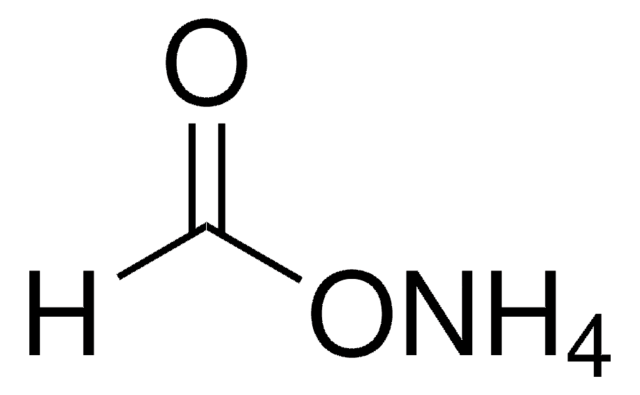1.00264
Formic acid 98-100%
for analysis EMSURE® ACS,Reag. Ph Eur
Synonym(s):
Formic acid, Methanoic acid, Formylic acid
About This Item
Recommended Products
grade
ACS reagent
Quality Level
Agency
reag. Ph. Eur.
vapor density
1.6 (vs air)
vapor pressure
44.8 mmHg ( 20 °C)
product line
EMSURE®
Assay
≥98% (alkalimetric)
form
liquid
autoignition temp.
1004 °F
expl. lim.
12-38 % (v/v)
57 %
technique(s)
HPLC: suitable
impurities
≤500 ppm Acetic acid (CH3COOH)
evapn. residue
≤10 ppm
color
APHA: ≤10
refractive index
n20/D 1.370 (lit.)
pH
2.2 (20 °C, 10 g/L in H2O)
bp
100-101 °C (lit.)
101 °C/1013 hPa
mp
8.2-8.4 °C (lit.)
transition temp
flash point 49.5 °C
density
1.22 g/mL at 25 °C (lit.)
anion traces
chloride (Cl-): ≤5 ppm
sulfate (SO42-): ≤5 ppm
sulfite (SO32-): ≤10 ppm
cation traces
Ag: ≤0.020 ppm
Al: ≤0.050 ppm
Ba: ≤0.050 ppm
Be: ≤0.020 ppm
Bi: ≤0.10 ppm
Ca: ≤0.20 ppm
Cd: ≤0.050 ppm
Co: ≤0.020 ppm
Cr: ≤0.050 ppm
Cu: ≤0.020 ppm
Fe: ≤2.0 ppm
Ge: ≤0.050 ppm
K: ≤0.10 ppm
Li: ≤0.020 ppm
Mg: ≤0.50 ppm
Mn: ≤0.050 ppm
Mo: ≤0.020 ppm
NH4+: ≤10 ppm
Na: ≤0.50 ppm
Ni: ≤0.050 ppm
Pb: ≤0.020 ppm
Sr: ≤0.020 ppm
Ti: ≤0.10 ppm
Tl: ≤0.050 ppm
V: ≤0.050 ppm
Zn: ≤0.050 ppm
Zr: ≤0.10 ppm
heavy metals (as Pb): ≤10 ppm
SMILES string
OC=O
storage temp.
15-25°C
InChI
1S/CH2O2/c2-1-3/h1H,(H,2,3)
InChI key
BDAGIHXWWSANSR-UHFFFAOYSA-N
Looking for similar products? Visit Product Comparison Guide
Related Categories
General description
Application
- Modified QuEChERS method combined with ultra performance liquid chromatography-tandem mass spectrometry for detection of cyclopiazonic acid in feeds: This study demonstrates the use of 98-100% formic acid in a modified QuEChERS method, enhancing the efficiency of toxin detection in animal feeds, crucial for maintaining food safety and environmental health (Peng et al., 2024).
- Adapting Fabric Phase Sorptive Extraction as an Innovative Multitool for Sample Transfer and Extraction in Pharmacokinetic Analysis Followed by LC-MS Determination of Levofloxacin in Plasma Samples: This study utilizes formic acid in developing advanced extraction methods for pharmacokinetic analysis, critical for drug development and therapeutic monitoring in pharmaceutical research (Ekin Dolaksız et al., 2024).
- Stability Indicating Method Development and Validation of Glycyrrhizin Using RP-HPLC-DAD: Application to Glycyrrhiza glabra Extract: This research uses formic acid in chromatographic analyses to ensure the stability and quality of herbal medicine compounds, relevant in both pharmaceutical and biotechnological fields (Lyngdoh et al., 2024).
Analysis Note
Expiry date : see product label
Legal Information
Signal Word
Danger
Hazard Statements
Precautionary Statements
Hazard Classifications
Acute Tox. 3 Inhalation - Acute Tox. 4 Oral - Eye Dam. 1 - Flam. Liq. 3 - Skin Corr. 1A
Supplementary Hazards
Storage Class Code
3 - Flammable liquids
WGK
WGK 1
Flash Point(F)
121.1 °F - closed cup
Flash Point(C)
49.5 °C - closed cup
Regulatory Listings
Regulatory Listings are mainly provided for chemical products. Only limited information can be provided here for non-chemical products. No entry means none of the components are listed. It is the user’s obligation to ensure the safe and legal use of the product.
PDSCL
Deleterious substance
FSL
Flammable liquids
Type 2 petroleums
Hazardous rank III
Water soluble liquid
ISHL Indicated Name
Substances Subject to be Indicated Names
ISHL Notified Names
Substances Subject to be Notified Names
Certificates of Analysis (COA)
Search for Certificates of Analysis (COA) by entering the products Lot/Batch Number. Lot and Batch Numbers can be found on a product’s label following the words ‘Lot’ or ‘Batch’.
Already Own This Product?
Find documentation for the products that you have recently purchased in the Document Library.
Customers Also Viewed
Articles
HPTLC-MS was used to analyze stevioside and rebaudioside in artificial sweeteners, stevia plants, cola and isotonic drinks with a minimum of sample preparation.
Protocols
Thin layer chromatography coupled with mass spectrometry does not require substantial sample preparation. Energy drinks can be applied without dilution directly onto the TLC plate.
HPTLC–MS analysis of quinine in tonic water and caffeine in coffee and cola drinks. Tonic and cola drinks decarbonized through ultrasonication, and coffee extracted through PTFE filter.
Method: Photometric determination with 3,3'-Diaminobenzidine
Our team of scientists has experience in all areas of research including Life Science, Material Science, Chemical Synthesis, Chromatography, Analytical and many others.
Contact Technical Service







